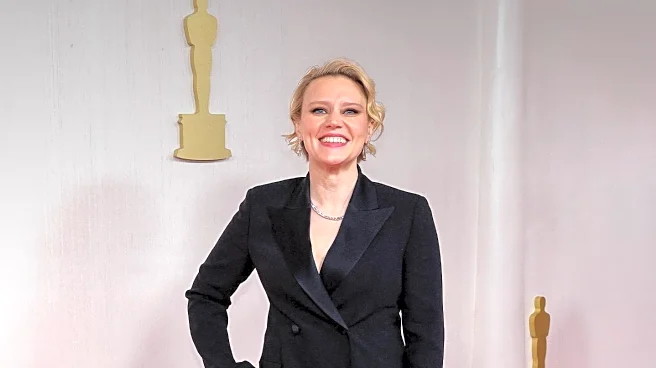What's Happening?
Kate McKinnon, a former cast member of Saturday Night Live, has publicly shared her diagnosis of geographic tongue, an inflammatory but harmless condition affecting the tongue's surface. In an interview with People magazine, McKinnon described the condition, which is characterized by patches on the tongue that are missing papillae, the tiny bumps that give the tongue its rough texture. These patches can move around the tongue, giving it an appearance similar to a map, hence the name 'geographic tongue.' While the condition is not harmful, it can cause discomfort or increased sensitivity to certain foods. McKinnon humorously noted that she and a friend, who also has the condition, often joke about how 'geographic' their tongues are on any given day.
Why It's Important?
The revelation by a high-profile figure like Kate McKinnon brings attention to geographic tongue, a condition that, while not widely known, affects many people. By discussing her experience, McKinnon helps to demystify the condition and reduce any stigma associated with it. This can encourage others who have similar conditions to speak openly about their experiences, fostering a more informed and understanding public. Additionally, McKinnon's disclosure may prompt individuals experiencing similar symptoms to seek medical advice, potentially leading to earlier diagnosis and management of the condition.
What's Next?
While McKinnon's disclosure is primarily personal, it may lead to increased public interest and awareness about geographic tongue. Medical professionals might see a rise in inquiries from patients concerned about similar symptoms. Furthermore, McKinnon's openness could inspire other public figures to share their own health experiences, contributing to a broader dialogue about health conditions that are often overlooked.
Beyond the Headlines
McKinnon's candidness about her condition also touches on broader themes of body positivity and acceptance. By openly discussing a condition that affects her appearance, she challenges societal norms about beauty and health, promoting a message of self-acceptance. This can have a positive impact on public attitudes towards visible health conditions, encouraging a more inclusive and empathetic society.











